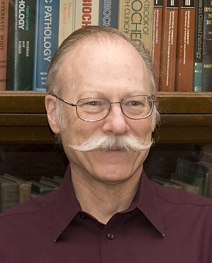 |
I am a medical school professor emeritus, research scientist, consultant, inventor, and amateur photographer. I have closed my lab in the Department of Pathology, Microbiology, and Immunology at The University of Nebraska Medical Center, and retired. I remain active at the university as an advisor, and I participate on a study of proline uptake and metabolism by Staphylococcus aureus directed by Drs. Paul Fey and McKenzie Lehman at UNMC. I will continue to serve as a scientist-consultant, and manage a number of hybridomas available for license through IRBF Development, LLC. |
Research and Teaching
Research
I enjoy work in the lab, and I remained "at the bench" until spring of 2021. I studied blood coagulation for over 20 years, and I continue to follow the research literature and friends and colleagues in the field. My later research focused on group B coxsackieviruses and their receptor (Carson, Chapman, and Tracy, 1997; Carson, Chapman, Hafenstein, and Tracy, 2011). I remain curious about selective pressures that drive viruses to bind molecules other than their functional receptor (Carson, Chapman, Hafenstein, and Tracy, 2011), and mechanisms that affect virus stability and efficiency for infecting target cells (Carson et al, 2016; Carson and Cole, 2020). I continue to collaborate on studies of proline metabolism by Staphylococcus aureus (Lehman et al, 2019).
Teaching Experience
Through 2019, Dr. Sam Pirruccello and I coordinated four hours of lectures in the Hematology section of the second year curriculum, and more recently, the Blood Organ Core of the first year medical curriculum. I taught the fundamental biochemistry of blood coagulation, fibrinolysis, and their regulation. This introduced the students to platelets, enzymes, cofactors, inhibitors, proteins that participate in hemostasis, and the basic principles involved in regulation (e.g. activation, feedback loops, inhibition). This prepared them with the vocabulary and concepts necessary to appreciate Dr. Pirruccello's lectures on clinical bleeding and clinical thrombosis.
In the Graduate College, Dr. Maurice Godfrey and I taught Molecular Basis of Disease. (Dr. Godfrey is the 2022 ASHG Motulsky-Childs awardee for excellence in Genetic Education.) This was a three-credit upper-level graduate course concentrating on human biochemical genetics. Following a brief review of genetic principles, well-studied inborn errors of metabolism and development were used to illustrate how genetic variations (e.g. mutations) alter metabolic, developmental, or signaling systems and result in the expressed phenotype. Disease processes were considered in the context of environment and genetic diversity. One-third of the course involved discussion of contemporary literature relevant to diseases for which mechanisms are not yet well understood or only recently elucidated. This required the graduate students to learn on their own behalf prior to the discussion.